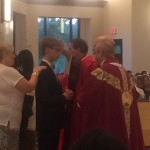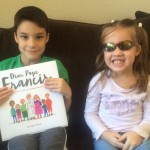
I walked down the street yesterday to check on my neighbors and bring them a plate of cookies. They’re a young Muslim family with three small children, and the mom (who asked me not to use her name so I’m calling her A) has told me the stories of how her family was treated in the months following 9/11. Ever since the terror attacks in Paris, I’ve been worried about how this lovely woman would be treated when people saw her out in her hijab.
There is a large Muslim population in this part of the Dallas metro area, and seeing girls and women wearing headscarves is a regular part of our lives. We know where the halal grocery store is, and their mosque is in the neighboring town. They may not be the first image that comes to mind when one thinks of Texans, but our Muslim neighbors are a part of our community.
When A opened the door, her face beamed her usual welcoming smile, and her children squealed when they realized that there were chocolate cookies on that plate in my hands. As they danced and spun around me, I asked how she was holding up. Her smile flickered for a moment, and then she raised her chin and said that they were nervous but good. One of her friends had had epithets yelled at her in the parking lot of a local store, but she hadn’t encountered that personally. The people she did see were less friendly though. A is a big personality and almost instantly and universally liked, so the sideways nervous glances which she is now getting make her sad.
“I understand why they are nervous,” she said. “It’s just ignorance, and the fact that I’m dressed differently from them, but like the people who did something horrific. If people who look like me are monsters, what’s to stop me from being a monster too?”
I asked her if there had been any bright spots, anything that gave her hope. She smiled and said, “There was a woman at Aldi yesterday who came over to me in the parking lot. I thought at first that she was going to say something awful because she looked so determined, and I didn’t want my children to hear that, but she didn’t. She just said ‘Excuse me, but can I just pray with you for your family’s safety?’ Before I had even answered, she said “God in Heaven, please watch over this family and keep them safe. May everyone they encounter treat them with kindness and respect and see their humanity before they see anything else. Please, God, keep them safe.” Then she handed her business card to my neighbor and said, “If you ever need anything, or feel unsafe or threatened, please call me. I know people who can help you.”
The woman in the parking lot explained to A that her pastor had preached about the need to watch out for our Middle Eastern neighbors, of all faiths, for the next few weeks. He suggesting praying with anyone who was willing, but to pray to God in Heaven as it is a title which is universally acceptable. Then he told his parishioners that they were to offer sanctuary to anyone who needed it, and make sure they knew that conversion wasn’t required for help or safety.
“I have no interest in becoming a Christian,” A told me, “but if I were, I would go to their church. They seem to live what they profess to believe, and they care about me and my family just as we are.”
It reminded me so much of Mother Teresa who once said “No one hears the voice of God over the sound of an empty stomach.” I don’t know where the church is that the stranger attends, but I will begin following their example. I’m not going to let the fact that someone is a different religion from me to stop me from asking if they need or want to pray.
Photo credit: Woman in hijab By Zharif the Future Surgeon's (http://www.flickr.com/photos/zharif/3504796495/) [CC BY 2.0 (http://creativecommons.org/licenses/by/2.0)], via Wikimedia Commons











